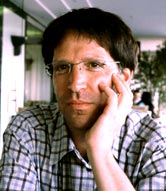The roots of the film go back to the end of 2004.
Several of us at Wilton Films had been involved in various ways with the “people’s power” revolutions of recent years.
I had spent a lot of time in Yugoslavia during the war there and a lot of close friends had been very involved in the demonstrations that eventually brought down Milosevic. We have also worked in Georgia and Ukraine for years, and I was in fact filming in Kyrgyzstan just a few days before that government collapsed.
So the idea of making a film following a revolution was in the air for us, but, like so many films, the reason we ended up in Lebanon was down to serendipity. Tania Rakhmanova, executive producer on the film, was in Lebanon in February, on a skiing vacation. Following the funeral of ex-Prime Minister Rafik Hariri, she decided not to hit the slopes, but to join the first big demonstrations on Monday, February 21, 2005. While she was there, she met Asma Andraos and Daniella Rizkallah, who were just setting up what would be called Civil Society. And at that moment we knew we could make a film.
At the start of filming I was worried that there wouldn’t be enough excitement to make a film. After all, the demonstrations were over, the elections looked like a sure thing for the Hariri camp, and there was a general air of post-revolutionary malaise in Lebanon. But then, before we had really got going, field producer Tima Khalil suggested it might be interesting to take a trip up to the town of Bekfeya, where the right-wing Christian Phalange Party was born. They were putting back a statue of the Phalange’s founder, Pierre Gemeyal, which had been blown up by pro-Syrians several years ago.
Our principle cameraman was en route from shooting a soap opera in Dubai, and our sound recordist was on a plane from a different shoot in Sudan. So we asked another cameraman to step in and I did the sound. After filming the statue’s unveiling, all hell broke loose. The Phalange supporters marched past the Pro-Syrian party building in town, taunting them with their chants. The inevitable riot began. Bottles and rocks were thrown and the Lebanese army intervened to keep the two sides apart. It was when an Army jeep came screeching up through out of the fog, with a mounted 50 calibre machine gun, (I remember that in an earlier war we used to call them water-skiers, because of the way the gunners hold onto the twin-handled weapon) that I realized it wasn’t going to be all THAT peaceful.
At times, watching Lebanon struggle to re-assert its democratic history, I was full of awe. At other moments, for example filming thousands of mourners at the funeral of the pro-democracy journalist Samir Kassir, it filled me with a kind of futile pity. Four rounds of elections, and two car bombs later, we wrapped the shoot. It was an extraordinary experience.

